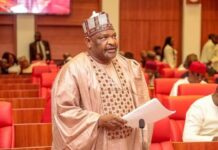As part of its effort to explore innovative sources of funding for its climate action plans towards sustainable development, the Federal Ministry of Environment in collaboration with the Ministry of Finance held a Stakeholders’ Consultation on the pilot issuance of Green bonds in Nigeria.
The event which held on Friday in Abuja drew participants from the Federal Ministry of Finance, Federal Ministry of Budget and National Planning, Ministry of Trade and Investment, Nigerian Stock Exchange (NSE), Debt Management Office (DMO), Central Bank of Nigeria (CBN), Securities and Exchange Commission (SEC), National Assembly, Africa Finance Corporation, World Bank, UNEP, UNDP, McKingsey & Company, Chapel Hill Denham, Stanbic IBTC, DFID/NIAF and other private sector representatives.
In the face of vast investment needs for the transition to a sustainable, low-carbon and climate resilient economy, the Nigerian government has made it clear that private funding is required and according to the Minister of Environment Amina Mohammed, tapping into the international capital markets, as well as domestic capital, is crucial.
The Minister also stated that the Ministry of Environment and the Ministry of Finance seek to explore and develop a product that can leverage and channel resources towards viable Green projects but can also contribute to the achievement of the nation’s development objectives.
Speaking at the event, Mr. Oscar Onyema, CEO of the Nigerian Stock Exchange said that there is significant market potential for Green Bonds in Nigeria as a developing market with a population in excess of 180 Million people, with projected annual emissions of 900m tonnes requires significant capital to develop mitigation and adaptation interventions that will reduce it.
He further stated that green bonds could mobilize funds from investors who have strong environmental focus, require transparency and have lower risk appetite.
The United Nations Environment Programme (UNEP) disclosed that Green bonds have the potential to deliver the low carbon, climate resilient infrastructure needed in Nigeria (e.g. renewable energy, low-carbon transport, water infrastructure, sustainable agriculture and more) with access to private capital at scale through the international (and domestic) bond markets.
According to UNEP, access to private capital is essential to substantially lower the cost of capital for green projects, and enable Nigeria to move to a less emissions intensive growth path.
Also, Nigeria’s Intended Nationally Determined Contribution’s (INDC) document puts forth the stated targets for Nigeria’s contribution towards climate improvement and following a low carbon path to progress.
It was noted that the resource needed to finance the NDCs is put at USD142 between now and 2030. Creative channels for mobilizing resources locally and externally are needed. The issuance of Green Bonds, which have grown from USD3b per annum since 2012 to an estimated USD100 b for 2016 present a viable option.
A statement issued by the Federal Ministry of Environment disclosed that Green bonds have been the subject of increasing government, investor and media interest and expectations, driven by the prospect of matching large low‑carbon investment requirements with the trillions of dollars in global bond markets held by institutional investors.
The Ministry of environment plans to hold a sensitization workshop in Lagos for Capital Market Operators in Nigeria.


























